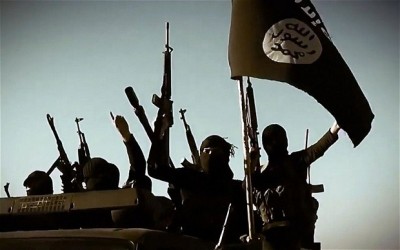
Filmed by a young French Muslim journalist who infiltrated the group with a hidden camera, the Canal Plus documentary takes an extraordinary inside look at the group, which called itself the Soldiers of Allah. The cell was nominally led by a young ex-convict who called himself Abu Oussama, who speaks dreamily about his coming death, the palace that awaits him in paradise, the winged horse made of gold and rubies, and the women: “I’m not making this up, I swear,” he breathes.
“I got the feeling they’re beyond saving. The programming is so well done, if you will, that you can only be their enemy. There is no discussing with them,” according to the journalist, who took the pseudonym Said Ramzy in the credits and was known to the jihadis as Abu Hamza.
Ramzy told The Associated Press the cell was actually directed by a Frenchman sent home from Syria by the extremist organization to plot an attack. Ramzy was considered valuable because, unlike the other members of the cell, he had no criminal past and had never been identified as a radical.
Abu Oussama had been flagged to police by his father, detained in Turkey trying to reach Syria, and imprisoned in France for five months until authorities determined he was no longer a danger, he tells Ramzy.
“They said since I was deradicalized, since I was quiet …” he says, giggling toward the camera he cannot see. “It’s all part of the ruse, brother.”
Oussama appears to trust Ramzy, but not all of the cell’s nine members had the same faith. One, who went by the name Joseph, warns Ramzy once that he’s been found out, without ever explaining. The others ignore the warning, apparently even after all but Ramzy and the Islamic State fighter sent from Syria were rounded up.
“It’s just you and me,” the man writes in a message to Ramzy as he prepares to hand over a second set of instructions via a mysterious veiled woman who meets the journalist at a school to deliver the envelope.
Islamic State carefully controls its public image via a sophisticated propaganda apparatus and, in at least one case, allowing a crew to film its members in Syria under specifically vetted conditions. A second journalist involved in the documentary, who went by the name Marc Armone, said he and Ramzy wanted to get past an edited version of Islamic State and into the minds of its European recruits.
They went first to French mosques that adhere to the austere Salafi strain of Islam, which many in the French government have linked directly to Islamic State’s claim of religious purity. But there, Ramzy was warned to be on guard against the extremist recruiters – and he later discovered an entire genre of Islamic State propaganda that derides French Salafists.
“They are fundamentalists but they are also opposed to taking political power,” Armone said. For the jihadis, “it’s the Islam of the Internet, of McDonalds and Subway. There are a handful of mosques they go to, but really just a handful.”
The main recruiting grounds are the Internet – specifically the encrypted app Telegram – and prison. And, the film says, this is where the French system seems least equipped to handle them.
The police intelligence unit that searches for jihadi recruitment materials has no Arabic speakers, relying instead on Internet translation programs. The prisons are equally strapped for resources, according to the filmmakers.
Ramzy is drawn into the jihadi web via a Facebook page that turns out to be managed from inside a French prison, by an inmate who goes so far as to send his bank transfer information for donations.
The story accelerates after the Nov. 13 attacks in Paris that left 130 people dead and the city reeling from shock. One of the cell is put under house arrest during the state of emergency, and the others frantically and somewhat ineptly try to obtain a working Kalashnikov and explosives to carry out an attack on a night club ordered by Souleymane, the Frenchman sent by Islamic State from Syria.
By then, Armone said, France’s intelligence services both knew about the cell and knew that a journalist had infiltrated. Ramzy was never arrested, and he cuts off contact when the suspicious cell member sends him a final message after the December sweeps dismantled the group: “You’re finished.”
Ramzy said he was nervous but reminded himself throughout the six-month process of the activists in Raqqa who continue to risk their lives to film life under Islamic State rule. And, he added, the members of the cell “aren’t terribly clever.”
“That makes sense, because to think you’re going to paradise for killing innocent people, you have to be especially stupid,” he added. “And that may yet be what saves us.”
France24/(AP)

Leave a Reply
You must be logged in to post a comment.